
PRESS RELEASE Aspen Reports $29.8 million Net Income for the Twelve Months Ended December 31, 2021 (2020: net loss after tax of $(56.4) million), Driven by Improved Underwriting Performance Hamilton, Bermuda, May 02, 2022 - Aspen Insurance Holdings Limited (“Aspen”) (NYSE: AHL) reported results today for the twelve months ended December 31, 2021. Mark Cloutier, Group Executive Chairman and Chief Executive Officer, commented: “I am pleased to report that 2021 was a further year of good progress at Aspen, with the business reporting a net income of $29.8 million and an operating income of $95.1 million, a significant improvement over 2020. Moreover, this performance occurred in a year that saw the world continuing to adapt to the effects of the ongoing global pandemic. Now as we enter May 2022, our world continues to be rocked by the horrific events unfolding as a result of the invasion in Ukraine. Our thoughts and prayers are with all those whose lives continue to be forever impacted. Underpinning Aspen’s improved result was a continued focus on underwriting discipline with our adjusted Combined Ratio improving from 103.4% in 2020, which included 14.3 percentage points of catastrophe losses, to 98.8% in 2021; this included 13.6 percentage points of catastrophe losses as well as the full economic benefit of the Adverse Development Cover we entered into during 2020. This trend underscores the improvement initiatives we have put in place, while also showing we have been an active participant in capturing the opportunities presented by improved market and trading conditions. We also have made significant progress in the optimization of our platforms, including the expansion of our Lloyd’s capacity to £900 million, enabling our teams to go to market with a clearer proposition and greater scale as we shift our focus to growth. Our well-established Capital Markets business, Aspen Capital Partners, is a core part of our strategy at Aspen, and managed capital grew to more than $900 million. This is particularly pleasing, given the challenging renewal environment that many capital market vehicles have experienced recently, and it reflects the sophistication of our solutions across both property and casualty lines of business, the depth of our investor relationships and our established track record. We expect to see continued growth in 2022 as we work with our trading partners and investors to bring new and innovative capital markets solutions to the market, while at the same time seeing the benefit of diversifying, capital light fee income benefiting our earnings. Exhibit 99.1

Being a responsible business is also an essential part of our vision and strategy, and 2021 saw us launch our inaugural ESG report. This report is an important starting point on our journey to build a more sustainable future for Aspen, and outlines the significant work we have already done, including building a more diverse culture, understanding the impact of what we underwrite and thinking carefully about where we invest. In the first half of 2021, we refreshed our brand, aligning our external identity with our collaborative internal culture and clear vision to transform risk into opportunity for our clients. Looking ahead, while we are mindful of broader macroeconomic uncertainty and continued inflationary claims trends, we are confident in the outlook and positioning of our business. We are successfully shifting from ‘transforming’ Aspen to ‘activating’ its true potential, and I am excited by the energy, enthusiasm and commitment I see from our people, the differentiated solutions our platforms are creating for clients and what I believe we can accomplish in 2022 and beyond.” Key strategic and financial highlights Continued transformation with improved underlying underwriting performance • Gross written premiums of $3,938.4 million in the twelve months ended December 31, 2021, an increase of 6.5% compared to $3,698.5 million in the twelve months ended December 31, 2020, primarily due to rate improvements in financial and professional insurance lines, casualty and liability insurance lines and organic growth in casualty reinsurance lines. • Adjusted underwriting income of $28.3 million in the the twelve months ended December 31, 2021 up from $(87.0) million underwriting loss in the the twelve months ended December 31, 2020 resulting in an adjusted combined ratio of 98.8% for 2021 compared to 103.4% for 2020. Included in our underwriting results were catastrophe losses of $326.7 million, or 13.6 percentage points of the combined ratio in the the twelve months ended December 31, 2021 compared to $360.8 million, or 14.3 percentage points of the combined ratio in the twelve months ended December 31, 2020. Catastrophe losses in the twelve months ended December 31, 2020 also included losses associated with COVID-19 totaling $181.2 million. • Investment income of $147.5 million in the twelve months ended December 31, 2021 compared to $154.6 million in the twelve months ended December 31, 2020. • Net income after tax of $29.8 million and an operating income after tax of $95.1 million in the twelve months ended December 31, 2021 compared to a net loss after tax of $(56.4) million and an operating loss after tax of $(52.2) million in the twelve months ended December 31, 2020. Strong capital position • Group capital position remains robust, with total capital of approximately $2.8 billion as of December 31, 2021, a decrease of $0.1 billion compared with $2.9 billion** as of December 31, 2020. Significant strengthening of Aspen’s global platform • Our Capital Markets business contributed total fee income of $61.4 million in the twelve months ended December 31, 2021. Income from Aspen Capital Markets’ activities is primarily allocated to the line of business being ceded and serves to reduce acquisition expenses for that business. Total capital grew to $917.7 million as at December 31, 2021, compared with $680.8 million at December 31, 2020. Our continued ability to grow the capital we manage underpins our view that capital markets business and investors are key partners in Aspen’s further growth and innovation efforts. • In the first half of 2021 we refreshed our brand, aligning our external identity with our collaborative internal culture and clear vision to transform risk into opportunity for our clients. This was a significant external milestone in the transformation of Aspen. 2
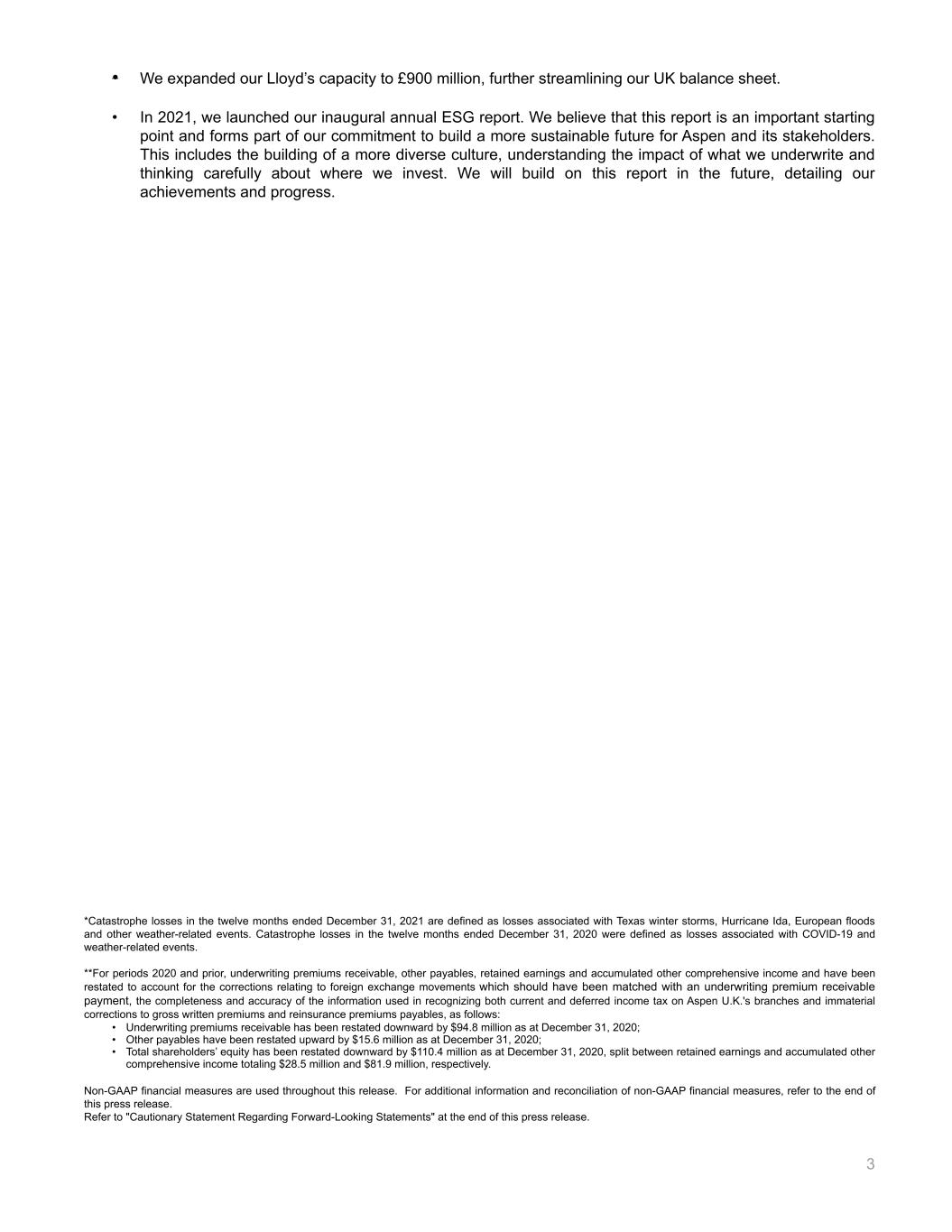
• We expanded our Lloyd’s capacity to £900 million, further streamlining our UK balance sheet. • In 2021, we launched our inaugural annual ESG report. We believe that this report is an important starting point and forms part of our commitment to build a more sustainable future for Aspen and its stakeholders. This includes the building of a more diverse culture, understanding the impact of what we underwrite and thinking carefully about where we invest. We will build on this report in the future, detailing our achievements and progress. *Catastrophe losses in the twelve months ended December 31, 2021 are defined as losses associated with Texas winter storms, Hurricane Ida, European floods and other weather-related events. Catastrophe losses in the twelve months ended December 31, 2020 were defined as losses associated with COVID-19 and weather-related events. **For periods 2020 and prior, underwriting premiums receivable, other payables, retained earnings and accumulated other comprehensive income and have been restated to account for the corrections relating to foreign exchange movements which should have been matched with an underwriting premium receivable payment, the completeness and accuracy of the information used in recognizing both current and deferred income tax on Aspen U.K.'s branches and immaterial corrections to gross written premiums and reinsurance premiums payables, as follows: • Underwriting premiums receivable has been restated downward by $94.8 million as at December 31, 2020; • Other payables have been restated upward by $15.6 million as at December 31, 2020; • Total shareholders’ equity has been restated downward by $110.4 million as at December 31, 2020, split between retained earnings and accumulated other comprehensive income totaling $28.5 million and $81.9 million, respectively. Non-GAAP financial measures are used throughout this release. For additional information and reconciliation of non-GAAP financial measures, refer to the end of this press release. Refer to "Cautionary Statement Regarding Forward-Looking Statements" at the end of this press release. 3
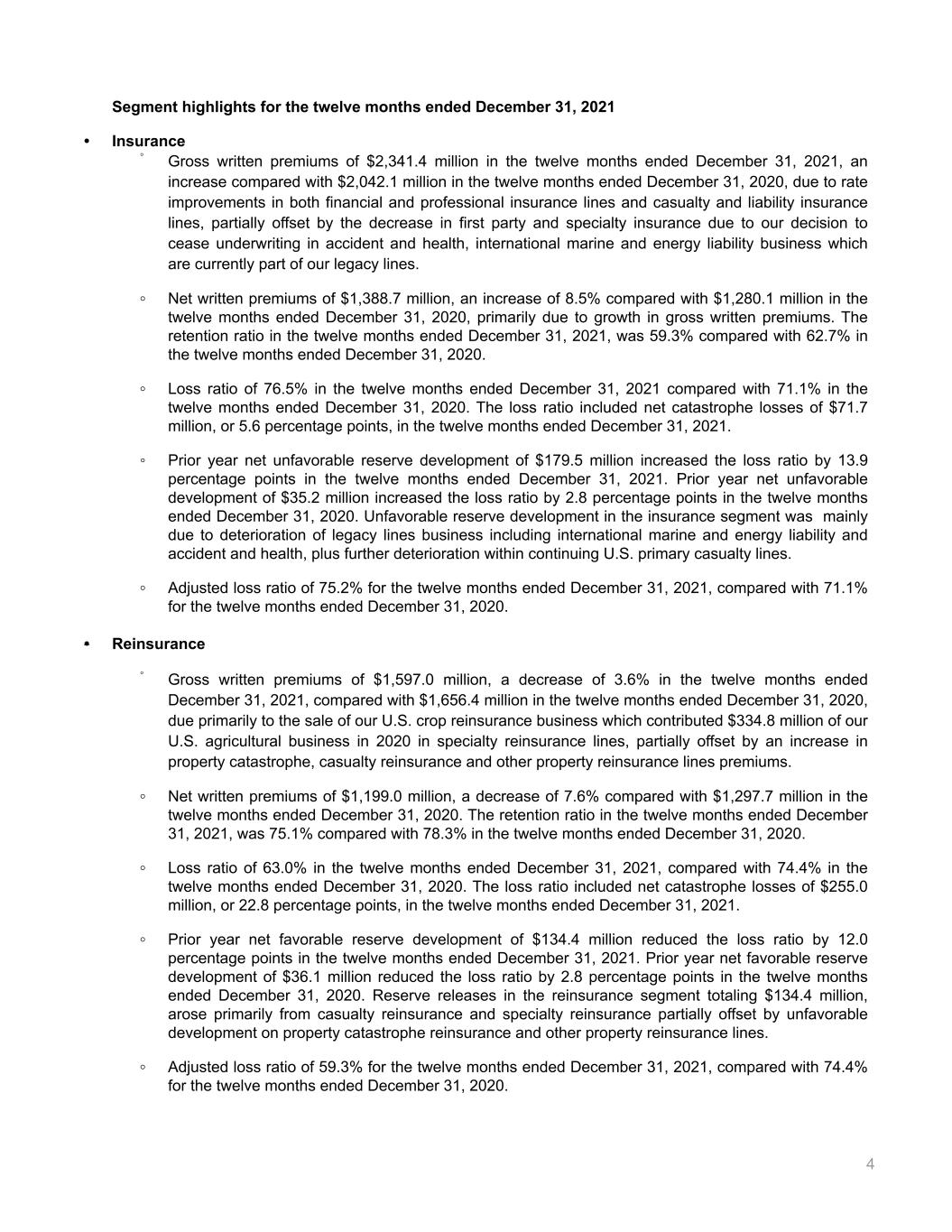
Segment highlights for the twelve months ended December 31, 2021 • Insurance ◦ Gross written premiums of $2,341.4 million in the twelve months ended December 31, 2021, an increase compared with $2,042.1 million in the twelve months ended December 31, 2020, due to rate improvements in both financial and professional insurance lines and casualty and liability insurance lines, partially offset by the decrease in first party and specialty insurance due to our decision to cease underwriting in accident and health, international marine and energy liability business which are currently part of our legacy lines. ◦ Net written premiums of $1,388.7 million, an increase of 8.5% compared with $1,280.1 million in the twelve months ended December 31, 2020, primarily due to growth in gross written premiums. The retention ratio in the twelve months ended December 31, 2021, was 59.3% compared with 62.7% in the twelve months ended December 31, 2020. ◦ Loss ratio of 76.5% in the twelve months ended December 31, 2021 compared with 71.1% in the twelve months ended December 31, 2020. The loss ratio included net catastrophe losses of $71.7 million, or 5.6 percentage points, in the twelve months ended December 31, 2021. ◦ Prior year net unfavorable reserve development of $179.5 million increased the loss ratio by 13.9 percentage points in the twelve months ended December 31, 2021. Prior year net unfavorable development of $35.2 million increased the loss ratio by 2.8 percentage points in the twelve months ended December 31, 2020. Unfavorable reserve development in the insurance segment was mainly due to deterioration of legacy lines business including international marine and energy liability and accident and health, plus further deterioration within continuing U.S. primary casualty lines. ◦ Adjusted loss ratio of 75.2% for the twelve months ended December 31, 2021, compared with 71.1% for the twelve months ended December 31, 2020. • Reinsurance ◦ Gross written premiums of $1,597.0 million, a decrease of 3.6% in the twelve months ended December 31, 2021, compared with $1,656.4 million in the twelve months ended December 31, 2020, due primarily to the sale of our U.S. crop reinsurance business which contributed $334.8 million of our U.S. agricultural business in 2020 in specialty reinsurance lines, partially offset by an increase in property catastrophe, casualty reinsurance and other property reinsurance lines premiums. ◦ Net written premiums of $1,199.0 million, a decrease of 7.6% compared with $1,297.7 million in the twelve months ended December 31, 2020. The retention ratio in the twelve months ended December 31, 2021, was 75.1% compared with 78.3% in the twelve months ended December 31, 2020. ◦ Loss ratio of 63.0% in the twelve months ended December 31, 2021, compared with 74.4% in the twelve months ended December 31, 2020. The loss ratio included net catastrophe losses of $255.0 million, or 22.8 percentage points, in the twelve months ended December 31, 2021. ◦ Prior year net favorable reserve development of $134.4 million reduced the loss ratio by 12.0 percentage points in the twelve months ended December 31, 2021. Prior year net favorable reserve development of $36.1 million reduced the loss ratio by 2.8 percentage points in the twelve months ended December 31, 2020. Reserve releases in the reinsurance segment totaling $134.4 million, arose primarily from casualty reinsurance and specialty reinsurance partially offset by unfavorable development on property catastrophe reinsurance and other property reinsurance lines. ◦ Adjusted loss ratio of 59.3% for the twelve months ended December 31, 2021, compared with 74.4% for the twelve months ended December 31, 2020. 4
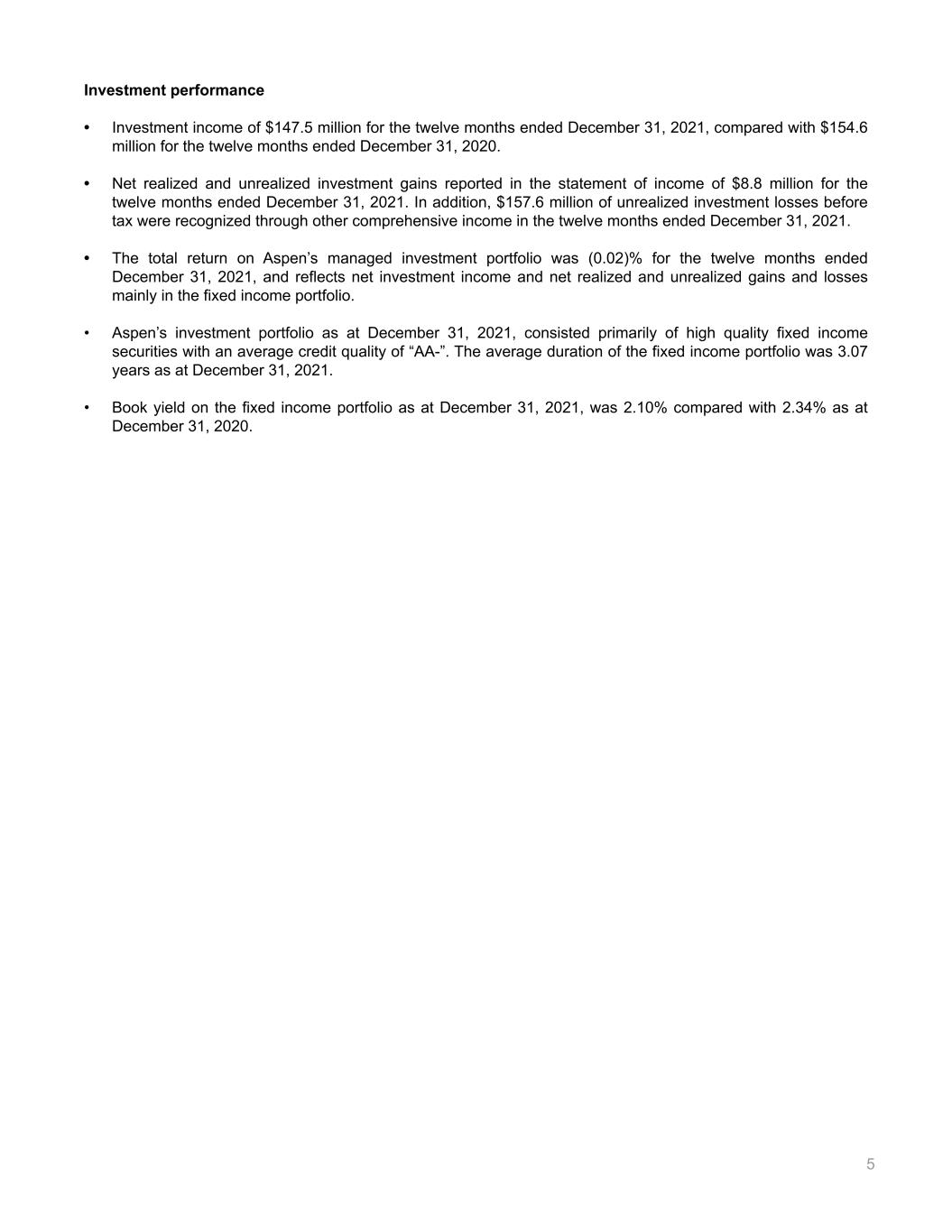
Investment performance • Investment income of $147.5 million for the twelve months ended December 31, 2021, compared with $154.6 million for the twelve months ended December 31, 2020. • Net realized and unrealized investment gains reported in the statement of income of $8.8 million for the twelve months ended December 31, 2021. In addition, $157.6 million of unrealized investment losses before tax were recognized through other comprehensive income in the twelve months ended December 31, 2021. • The total return on Aspen’s managed investment portfolio was (0.02)% for the twelve months ended December 31, 2021, and reflects net investment income and net realized and unrealized gains and losses mainly in the fixed income portfolio. • Aspen’s investment portfolio as at December 31, 2021, consisted primarily of high quality fixed income securities with an average credit quality of “AA-”. The average duration of the fixed income portfolio was 3.07 years as at December 31, 2021. • Book yield on the fixed income portfolio as at December 31, 2021, was 2.10% compared with 2.34% as at December 31, 2020. 5

Capital • Total shareholders’ equity was $2,774.8 million as at December 31, 2021, a decrease of $112.4 million compared with $2,887.2 million* as at December 31, 2020. *Correction of immaterial errors During the year, management identified immaterial errors which resulted in a revision of the Company’s comparative financial statements, as further described below: Foreign exchange gains and losses. During the second quarter of 2021, the Company identified an error regarding incorrect treatment of foreign exchange gains and losses arising as a result of currency matching issues within Aspen U.K.’s underwriting premiums receivable. The error resulted in previous foreign exchange revaluation and translation amounts, which should have been matched with an underwriting premium receivable payment being carried over, and were incorrectly included in Aspen U.K.’s underwriting premiums receivable, thereby overstating the related asset value. As a result underwriting premiums receivable, retained earnings and accumulated other comprehensive income being corrected downward by $89.7 million, $2.1 million and $87.6 million, respectively as at December 31, 2020. Income tax expense. During the year, the Company identified an error regarding the completeness and accuracy of the information used in recognizing both current and deferred income tax on Aspen U.K.'s branches and the associated application thereof in respect of local tax rules in the various jurisdictions. As a result, tax liability increased by $10.3 million, retained earnings were corrected downward by $16.0 million and accumulated other comprehensive income being corrected upward by $5.7 million, respectively, as at December 31, 2020. Net earned premium. During the year, the Company identified immaterial differences within gross written and re-insurance premium relating to prior years which have been corrected. As a result Gross written premium and underwriting premium receivable were corrected downward by $5.1 million, retained earnings were corrected downward by $5.3 million and reinsurance premiums payables increased by $5.3 million, respectively as at December 31, 2020. The Company has concluded that these errors are immaterial to the prior period financial statements of Aspen and that correcting the errors in the current period would likely materially misstate the current period financial statements. In accordance with U.S. GAAP, we have, therefore, corrected the errors in the comparatives of the 2021 financial statements of Aspen Holdings by adjusting the prior period information and adding disclosure of the errors. As a result, the Company intends to describe in the Form 20-F certain material weaknesses in the Company’s internal controls over financial reporting, including disclosure of the nature and status of remediation plans in place to address such deficiencies. 6

Earnings materials The earnings press release for the twelve months ended December 31, 2021 will be published on Aspen’s website at www.aspen.co. For further information please contact Marc MacGillivray, Chief Accounting Officer, Aspen Marc.MacGillivray@Aspen.co +44 20 7184 8455 7
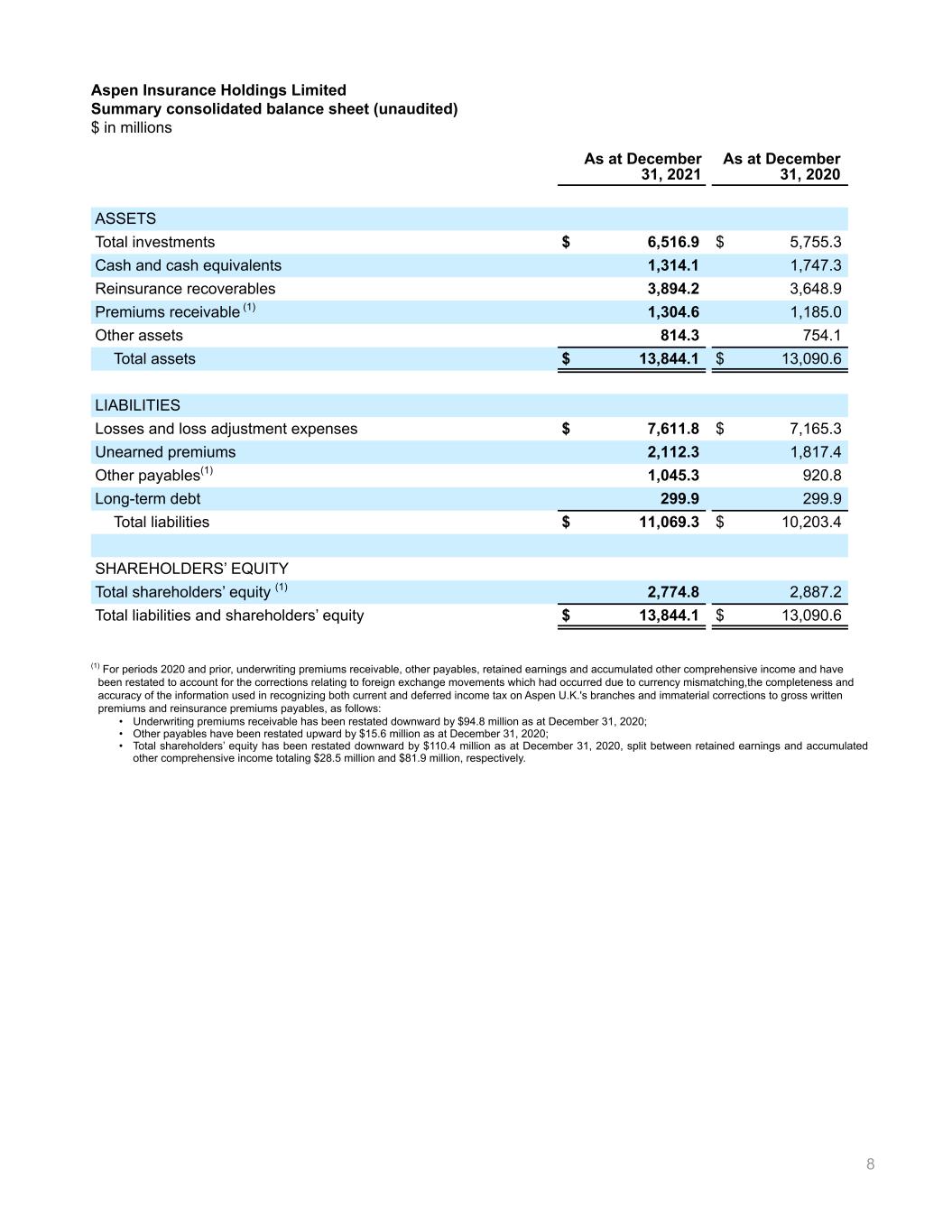
Aspen Insurance Holdings Limited Summary consolidated balance sheet (unaudited) $ in millions As at December 31, 2021 As at December 31, 2020 ASSETS Total investments $ 6,516.9 $ 5,755.3 Cash and cash equivalents 1,314.1 1,747.3 Reinsurance recoverables 3,894.2 3,648.9 Premiums receivable (1) 1,304.6 1,185.0 Other assets 814.3 754.1 Total assets $ 13,844.1 $ 13,090.6 LIABILITIES Losses and loss adjustment expenses $ 7,611.8 $ 7,165.3 Unearned premiums 2,112.3 1,817.4 Other payables(1) 1,045.3 920.8 Long-term debt 299.9 299.9 Total liabilities $ 11,069.3 $ 10,203.4 SHAREHOLDERS’ EQUITY Total shareholders’ equity (1) 2,774.8 2,887.2 Total liabilities and shareholders’ equity $ 13,844.1 $ 13,090.6 (1) For periods 2020 and prior, underwriting premiums receivable, other payables, retained earnings and accumulated other comprehensive income and have been restated to account for the corrections relating to foreign exchange movements which had occurred due to currency mismatching,the completeness and accuracy of the information used in recognizing both current and deferred income tax on Aspen U.K.'s branches and immaterial corrections to gross written premiums and reinsurance premiums payables, as follows: • Underwriting premiums receivable has been restated downward by $94.8 million as at December 31, 2020; • Other payables have been restated upward by $15.6 million as at December 31, 2020; • Total shareholders’ equity has been restated downward by $110.4 million as at December 31, 2020, split between retained earnings and accumulated other comprehensive income totaling $28.5 million and $81.9 million, respectively. 8

Aspen Insurance Holdings Limited Summary consolidated statement of income (unaudited) $ in millions, except ratios Twelve Months Ended December 31, 2021 2020 UNDERWRITING REVENUES Gross written premiums(5) $ 3,938.4 $ 3,698.5 Premiums ceded (1,350.7) (1,120.7) Net written premiums 2,587.7 2,577.8 Change in unearned premiums (177.2) (50.3) Net earned premiums 2,410.5 2,527.5 UNDERWRITING EXPENSES Losses and loss adjustment expenses 1,693.3 1,840.8 Amortization of deferred policy acquisition costs 414.1 465.7 General and administrative expenses 333.1 308.0 Total underwriting expenses 2,440.5 2,614.5 Underwriting (loss) (30.0) (87.0) Net investment income 147.5 154.6 Interest expense (1) (14.3) (33.9) Corporate expenses (64.3) (70.2) Other income (2) 3.9 39.0 Total other revenue 72.8 89.5 Non-operating expenses (3) (20.6) (32.7) Net realized and unrealized foreign exchange gains (4)(5) 4.1 2.2 Net realized and unrealized investment gains/(losses) 8.8 (10.0) INCOME/(LOSS) BEFORE TAX (5) 35.1 (38.0) Income tax (expense) (5.3) (18.4) NET INCOME/(LOSS) AFTER TAX (5) 29.8 (56.4) Dividends paid on preference shares (44.5) (44.5) Net (loss) available to ordinary shareholders (5) $ (14.7) $ (100.9) Loss ratio 70.2 % 72.8 % Policy acquisition expense ratio 17.2 % 18.4 % General and administrative expense ratio 13.8 % 12.2 % Expense ratio 31.0 % 30.6 % Combined ratio 101.2 % 103.4 % Adjusted combined ratio 98.8 % 103.4 % (1) Interest expense charge for the twelve months ended December 31, 2020 includes interest on deferred premium payments for the adverse development cover. (2) Other income in the prior period includes a $43.1 million gain contingency recognized in relation to the prior year’s sale of our surety business, based upon having met certain premium production levels prescribed in the sale agreement. (3) Non-operating expenses includes expenses in relation to severance, amortization of intangible assets and other non-recurring costs. (4) Includes the net realized and unrealized gains/(losses) from foreign exchange contracts. (5) Gross written premium, net realized and unrealized exchange gains/(losses) and income tax expense for the twelve months ended December 31, 2020 have been corrected to account for the corrections described on page 7, increasing net loss by $(16.3) million as follows; • Gross written premium has reduced by $(5.1) million; • Net realized and unrealized exchange gains/(losses) has reduced by $(1.4) million; and • Income tax expense has increased by $(9.8) million. • Income/(loss) before and after tax and retained (loss)/income figures have been corrected as a result of these corrections for the periods mentioned. 9
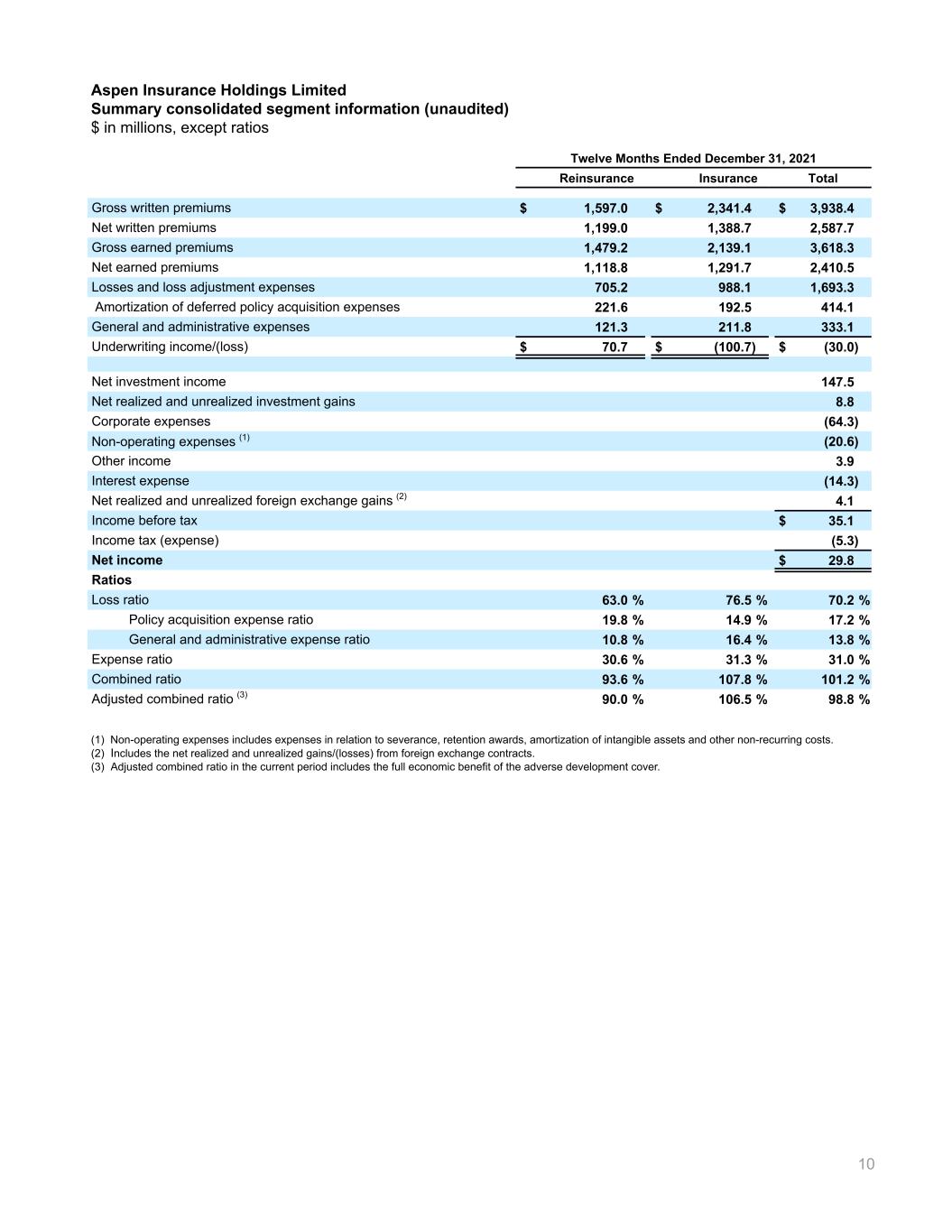
Aspen Insurance Holdings Limited Summary consolidated segment information (unaudited) $ in millions, except ratios Twelve Months Ended December 31, 2021 Reinsurance Insurance Total Gross written premiums $ 1,597.0 $ 2,341.4 $ 3,938.4 Net written premiums 1,199.0 1,388.7 2,587.7 Gross earned premiums 1,479.2 2,139.1 3,618.3 Net earned premiums 1,118.8 1,291.7 2,410.5 Losses and loss adjustment expenses 705.2 988.1 1,693.3 Amortization of deferred policy acquisition expenses 221.6 192.5 414.1 General and administrative expenses 121.3 211.8 333.1 Underwriting income/(loss) $ 70.7 $ (100.7) $ (30.0) Net investment income 147.5 Net realized and unrealized investment gains 8.8 Corporate expenses (64.3) Non-operating expenses (1) (20.6) Other income 3.9 Interest expense (14.3) Net realized and unrealized foreign exchange gains (2) 4.1 Income before tax $ 35.1 Income tax (expense) (5.3) Net income $ 29.8 Ratios Loss ratio 63.0 % 76.5 % 70.2 % Policy acquisition expense ratio 19.8 % 14.9 % 17.2 % General and administrative expense ratio 10.8 % 16.4 % 13.8 % Expense ratio 30.6 % 31.3 % 31.0 % Combined ratio 93.6 % 107.8 % 101.2 % Adjusted combined ratio (3) 90.0 % 106.5 % 98.8 % (1) Non-operating expenses includes expenses in relation to severance, retention awards, amortization of intangible assets and other non-recurring costs. (2) Includes the net realized and unrealized gains/(losses) from foreign exchange contracts. (3) Adjusted combined ratio in the current period includes the full economic benefit of the adverse development cover. 10
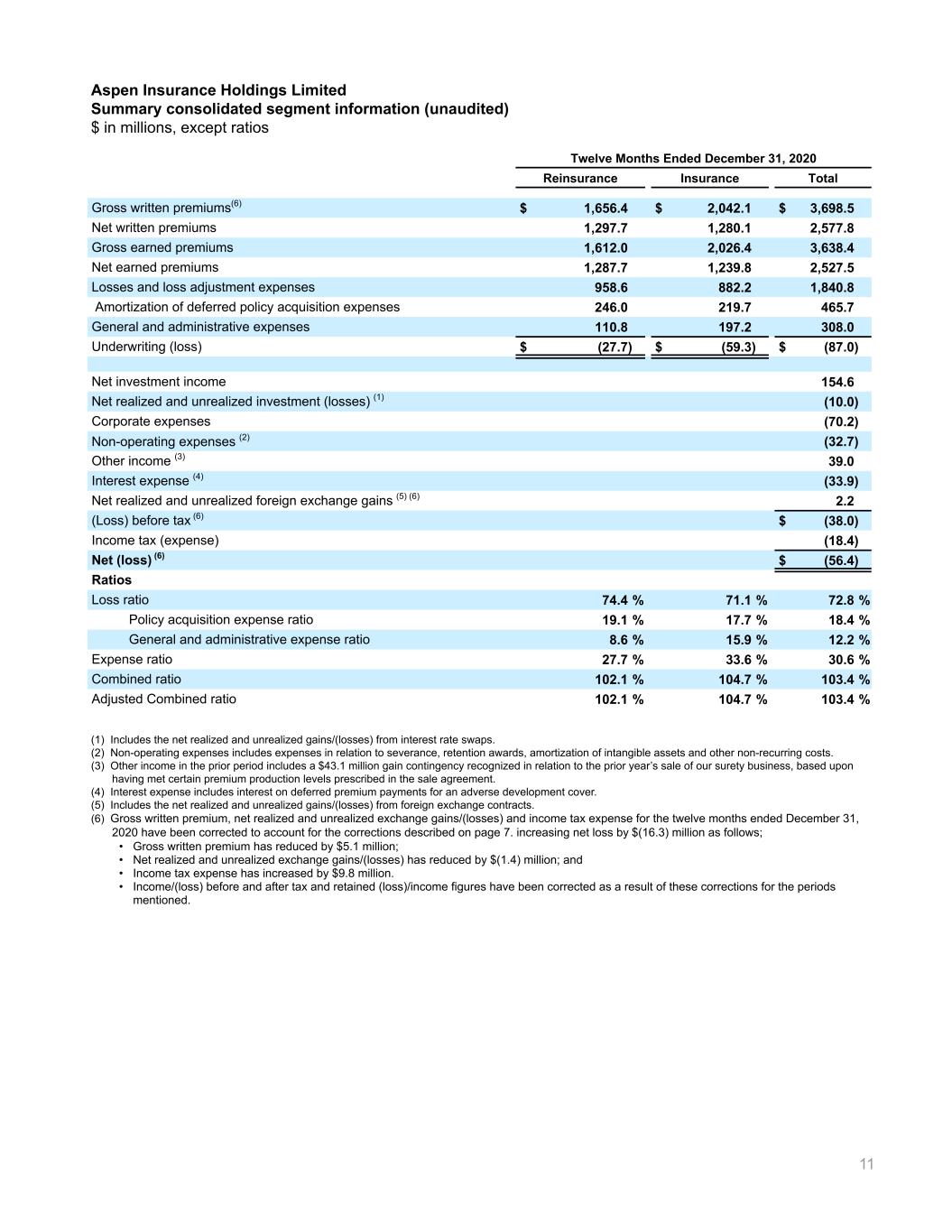
Aspen Insurance Holdings Limited Summary consolidated segment information (unaudited) $ in millions, except ratios Twelve Months Ended December 31, 2020 Reinsurance Insurance Total Gross written premiums(6) $ 1,656.4 $ 2,042.1 $ 3,698.5 Net written premiums 1,297.7 1,280.1 2,577.8 Gross earned premiums 1,612.0 2,026.4 3,638.4 Net earned premiums 1,287.7 1,239.8 2,527.5 Losses and loss adjustment expenses 958.6 882.2 1,840.8 Amortization of deferred policy acquisition expenses 246.0 219.7 465.7 General and administrative expenses 110.8 197.2 308.0 Underwriting (loss) $ (27.7) $ (59.3) $ (87.0) Net investment income 154.6 Net realized and unrealized investment (losses) (1) (10.0) Corporate expenses (70.2) Non-operating expenses (2) (32.7) Other income (3) 39.0 Interest expense (4) (33.9) Net realized and unrealized foreign exchange gains (5) (6) 2.2 (Loss) before tax (6) $ (38.0) Income tax (expense) (18.4) Net (loss) (6) $ (56.4) Ratios Loss ratio 74.4 % 71.1 % 72.8 % Policy acquisition expense ratio 19.1 % 17.7 % 18.4 % General and administrative expense ratio 8.6 % 15.9 % 12.2 % Expense ratio 27.7 % 33.6 % 30.6 % Combined ratio 102.1 % 104.7 % 103.4 % Adjusted Combined ratio 102.1 % 104.7 % 103.4 % (1) Includes the net realized and unrealized gains/(losses) from interest rate swaps. (2) Non-operating expenses includes expenses in relation to severance, retention awards, amortization of intangible assets and other non-recurring costs. (3) Other income in the prior period includes a $43.1 million gain contingency recognized in relation to the prior year’s sale of our surety business, based upon having met certain premium production levels prescribed in the sale agreement. (4) Interest expense includes interest on deferred premium payments for an adverse development cover. (5) Includes the net realized and unrealized gains/(losses) from foreign exchange contracts. (6) Gross written premium, net realized and unrealized exchange gains/(losses) and income tax expense for the twelve months ended December 31, 2020 have been corrected to account for the corrections described on page 7. increasing net loss by $(16.3) million as follows; • Gross written premium has reduced by $5.1 million; • Net realized and unrealized exchange gains/(losses) has reduced by $(1.4) million; and • Income tax expense has increased by $9.8 million. • Income/(loss) before and after tax and retained (loss)/income figures have been corrected as a result of these corrections for the periods mentioned. 11
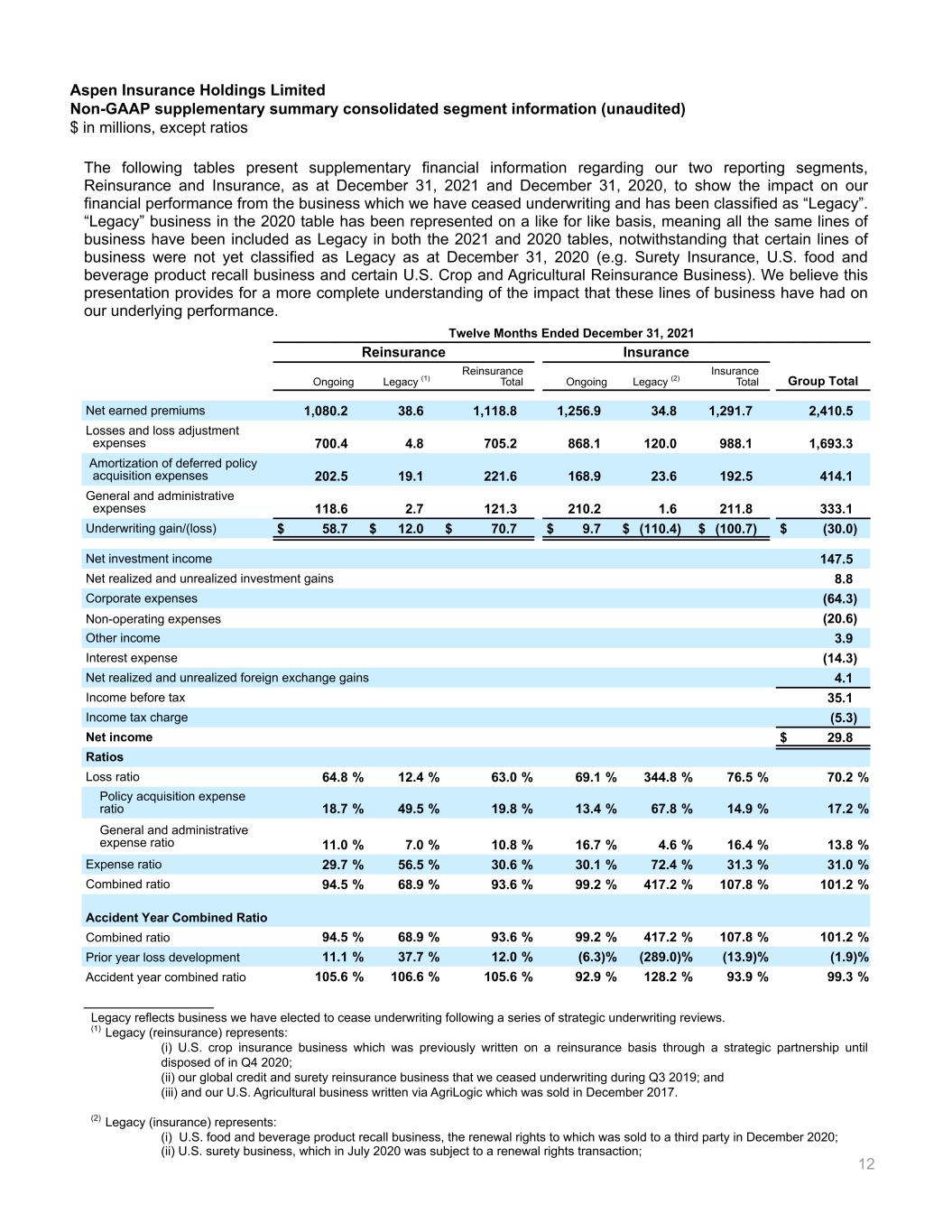
Aspen Insurance Holdings Limited Non-GAAP supplementary summary consolidated segment information (unaudited) $ in millions, except ratios The following tables present supplementary financial information regarding our two reporting segments, Reinsurance and Insurance, as at December 31, 2021 and December 31, 2020, to show the impact on our financial performance from the business which we have ceased underwriting and has been classified as “Legacy”. “Legacy” business in the 2020 table has been represented on a like for like basis, meaning all the same lines of business have been included as Legacy in both the 2021 and 2020 tables, notwithstanding that certain lines of business were not yet classified as Legacy as at December 31, 2020 (e.g. Surety Insurance, U.S. food and beverage product recall business and certain U.S. Crop and Agricultural Reinsurance Business). We believe this presentation provides for a more complete understanding of the impact that these lines of business have had on our underlying performance. Twelve Months Ended December 31, 2021 Reinsurance Insurance Ongoing Legacy (1) Reinsurance Total Ongoing Legacy (2) Insurance Total Group Total Net earned premiums 1,080.2 38.6 1,118.8 1,256.9 34.8 1,291.7 2,410.5 Losses and loss adjustment expenses 700.4 4.8 705.2 868.1 120.0 988.1 1,693.3 Amortization of deferred policy acquisition expenses 202.5 19.1 221.6 168.9 23.6 192.5 414.1 General and administrative expenses 118.6 2.7 121.3 210.2 1.6 211.8 333.1 Underwriting gain/(loss) $ 58.7 $ 12.0 $ 70.7 $ 9.7 $ (110.4) $ (100.7) $ (30.0) Net investment income 147.5 Net realized and unrealized investment gains 8.8 Corporate expenses (64.3) Non-operating expenses (20.6) Other income 3.9 Interest expense (14.3) Net realized and unrealized foreign exchange gains 4.1 Income before tax 35.1 Income tax charge (5.3) Net income $ 29.8 Ratios Loss ratio 64.8 % 12.4 % 63.0 % 69.1 % 344.8 % 76.5 % 70.2 % Policy acquisition expense ratio 18.7 % 49.5 % 19.8 % 13.4 % 67.8 % 14.9 % 17.2 % General and administrative expense ratio 11.0 % 7.0 % 10.8 % 16.7 % 4.6 % 16.4 % 13.8 % Expense ratio 29.7 % 56.5 % 30.6 % 30.1 % 72.4 % 31.3 % 31.0 % Combined ratio 94.5 % 68.9 % 93.6 % 99.2 % 417.2 % 107.8 % 101.2 % Accident Year Combined Ratio Combined ratio 94.5 % 68.9 % 93.6 % 99.2 % 417.2 % 107.8 % 101.2 % Prior year loss development 11.1 % 37.7 % 12.0 % (6.3) % (289.0) % (13.9) % (1.9) % Accident year combined ratio 105.6 % 106.6 % 105.6 % 92.9 % 128.2 % 93.9 % 99.3 % _______________ Legacy reflects business we have elected to cease underwriting following a series of strategic underwriting reviews. (1) Legacy (reinsurance) represents: (i) U.S. crop insurance business which was previously written on a reinsurance basis through a strategic partnership until disposed of in Q4 2020; (ii) our global credit and surety reinsurance business that we ceased underwriting during Q3 2019; and (iii) and our U.S. Agricultural business written via AgriLogic which was sold in December 2017. (2) Legacy (insurance) represents: (i) U.S. food and beverage product recall business, the renewal rights to which was sold to a third party in December 2020; (ii) U.S. surety business, which in July 2020 was subject to a renewal rights transaction; 12

(iii) includes international marine and energy liability products, and our global accident and health line of business, which, following a strategic review of our underwriting portfolio that began in December 2019, we determined to cease underwriting and started to wind down in February 2020 and March 2020, respectively; (iv) professional liability and property and casualty coverages for small to medium sized U.K.-based businesses that was bound through our managing general agent, Aspen Risk Management Limited that we placed into runoff during Q3 2019; (v) international cargo insurance that we ceased underwriting during Q4 2018; (vi) our aviation line of business, which we decided to cease underwriting during Q3 2018; (vii) marine hull insurance written through the Lloyd’s platform that we ceased underwriting during Q3 2018; (viii) international property insurance previously written via a joint underwriting initiative that we ceased underwriting during Q1 2017; and (ix) employers and public liability lines previously written that we ceased underwriting during Q4 2015. Twelve Months Ended December 31, 2020 Reinsurance Insurance Ongoing Legacy (1) Reinsurance Total Ongoing Legacy (2) Insurance Total Group Total Net earned premiums(3) 1,004.1 283.6 1,287.7 1,077.0 162.8 1,239.8 2,527.5 Losses and loss adjustment expenses 711.9 246.7 958.6 728.2 154.0 882.2 1,840.8 Amortization of deferred policy acquisition expenses 216.0 30.0 246.0 171.6 48.1 219.7 465.7 General and administrative expenses 107.3 3.5 110.8 178.1 19.1 197.2 308.0 Underwriting (loss)/gain $ (31.1) $ 3.4 $ (27.7) $ (0.9) $ (58.4) $ (59.3) $ (87.0) Net investment income 154.6 Net realized and unrealized investment (losses) (10.0) Corporate expenses (70.2) Non-operating expenses (32.7) Other income 39.0 Interest expense (33.9) Net realized and unrealized foreign exchange gains(3) 2.2 (Loss) before tax (38.0) Income tax charge(3) (18.4) Net (loss)(3) (56.4) Ratios Loss ratio 70.9 % 87.0 % 74.4 % 67.6 % 94.6 % 71.1 % 72.8 % Policy acquisition expense ratio 21.5 % 10.6 % 19.1 % 15.9 % 29.5 % 17.7 % 18.4 % General and administrative expense ratio 10.7 % 1.2 % 8.6 % 16.5 % 11.7 % 15.9 % 12.2 % Expense ratio 32.2 % 11.8 % 27.7 % 32.4 % 41.2 % 33.6 % 30.6 % Combined ratio 103.1 % 98.8 % 102.1 % 100.0 % 135.8 % 104.7 % 103.4 % Accident Year Combined Ratio Combined ratio 103.1 % 98.8 % 102.1 % 100.0 % 135.8 % 104.7 % 103.4 % Prior year loss development 3.4 % 0.8 % (2.8) % (0.5) % (18.3) % 2.8 % — % Accident year combined ratio 106.5 % 99.6 % 99.3 % 99.5 % 117.5 % 107.5 % 103.4 % _______________ Legacy reflects business we have elected to cease underwriting following a series of strategic underwriting reviews. (1) Legacy (reinsurance) represents: (i) U.S. crop insurance business which was previously written on a reinsurance basis through a strategic partnership until disposed of in Q4 2020; (ii) our global credit and surety reinsurance business that we ceased underwriting during Q3 2019; and (iii) and our U.S. Agricultural business written via AgriLogic which was sold in December 2017. (2) Legacy (insurance) represents: (i) U.S. food and beverage product recall business, the renewal rights to which was sold to a third party in December 2020; (ii) U.S. surety business, which in July 2020 was subject to a renewal rights transaction; 13
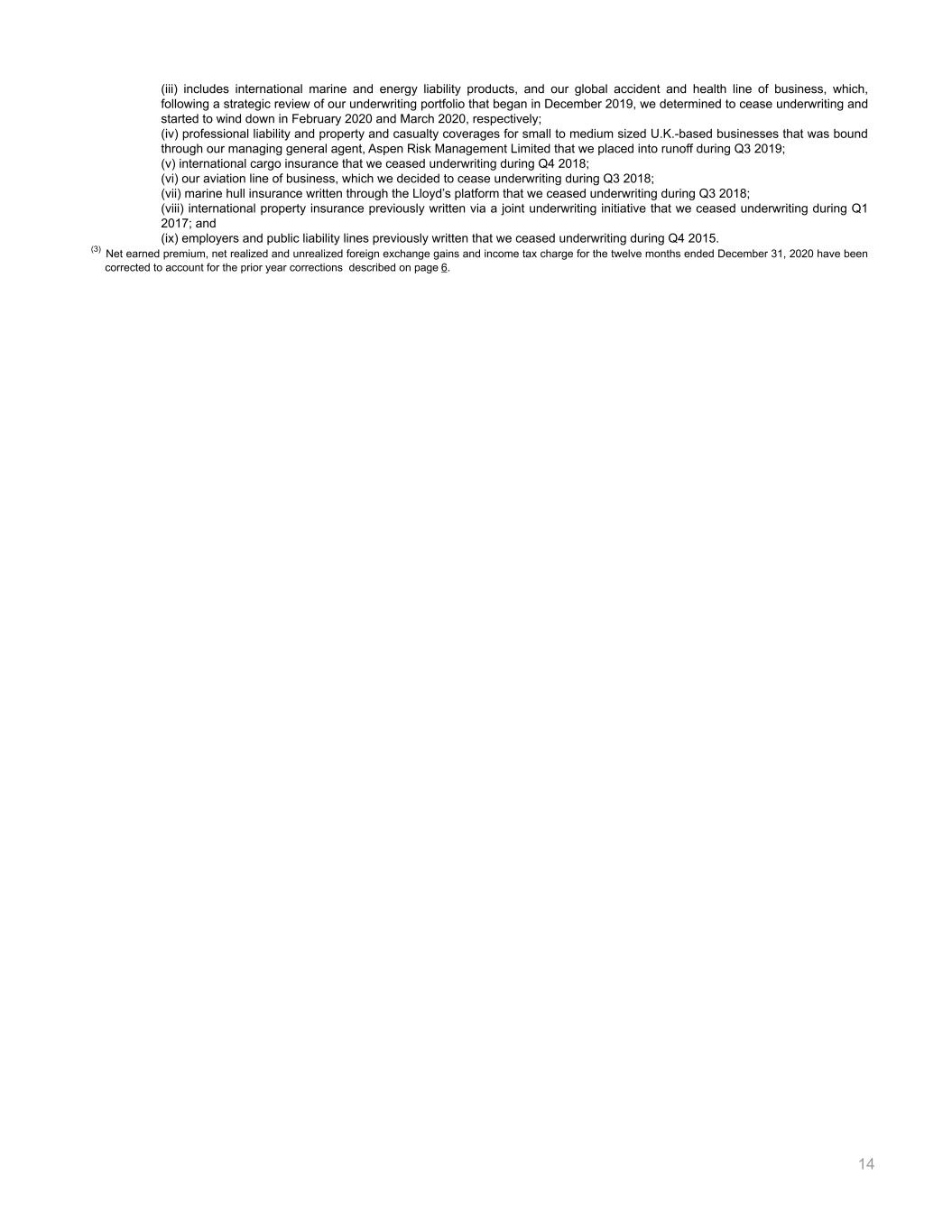
(iii) includes international marine and energy liability products, and our global accident and health line of business, which, following a strategic review of our underwriting portfolio that began in December 2019, we determined to cease underwriting and started to wind down in February 2020 and March 2020, respectively; (iv) professional liability and property and casualty coverages for small to medium sized U.K.-based businesses that was bound through our managing general agent, Aspen Risk Management Limited that we placed into runoff during Q3 2019; (v) international cargo insurance that we ceased underwriting during Q4 2018; (vi) our aviation line of business, which we decided to cease underwriting during Q3 2018; (vii) marine hull insurance written through the Lloyd’s platform that we ceased underwriting during Q3 2018; (viii) international property insurance previously written via a joint underwriting initiative that we ceased underwriting during Q1 2017; and (ix) employers and public liability lines previously written that we ceased underwriting during Q4 2015. (3) Net earned premium, net realized and unrealized foreign exchange gains and income tax charge for the twelve months ended December 31, 2020 have been corrected to account for the prior year corrections described on page 6. 14
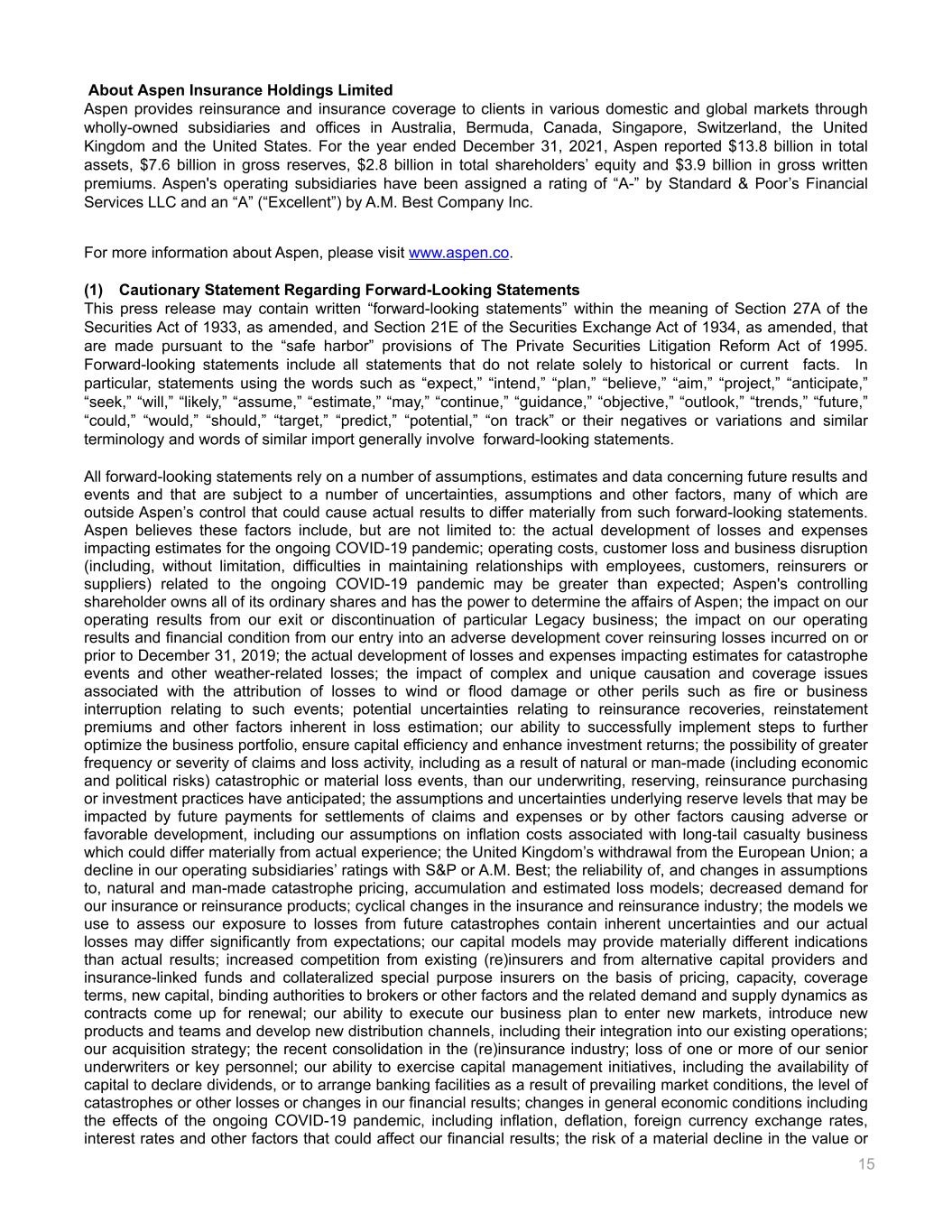
About Aspen Insurance Holdings Limited Aspen provides reinsurance and insurance coverage to clients in various domestic and global markets through wholly-owned subsidiaries and offices in Australia, Bermuda, Canada, Singapore, Switzerland, the United Kingdom and the United States. For the year ended December 31, 2021, Aspen reported $13.8 billion in total assets, $7.6 billion in gross reserves, $2.8 billion in total shareholders’ equity and $3.9 billion in gross written premiums. Aspen's operating subsidiaries have been assigned a rating of “A-” by Standard & Poor’s Financial Services LLC and an “A” (“Excellent”) by A.M. Best Company Inc. For more information about Aspen, please visit www.aspen.co. (1) Cautionary Statement Regarding Forward-Looking Statements This press release may contain written “forward-looking statements” within the meaning of Section 27A of the Securities Act of 1933, as amended, and Section 21E of the Securities Exchange Act of 1934, as amended, that are made pursuant to the “safe harbor” provisions of The Private Securities Litigation Reform Act of 1995. Forward-looking statements include all statements that do not relate solely to historical or current facts. In particular, statements using the words such as “expect,” “intend,” “plan,” “believe,” “aim,” “project,” “anticipate,” “seek,” “will,” “likely,” “assume,” “estimate,” “may,” “continue,” “guidance,” “objective,” “outlook,” “trends,” “future,” “could,” “would,” “should,” “target,” “predict,” “potential,” “on track” or their negatives or variations and similar terminology and words of similar import generally involve forward-looking statements. All forward-looking statements rely on a number of assumptions, estimates and data concerning future results and events and that are subject to a number of uncertainties, assumptions and other factors, many of which are outside Aspen’s control that could cause actual results to differ materially from such forward-looking statements. Aspen believes these factors include, but are not limited to: the actual development of losses and expenses impacting estimates for the ongoing COVID-19 pandemic; operating costs, customer loss and business disruption (including, without limitation, difficulties in maintaining relationships with employees, customers, reinsurers or suppliers) related to the ongoing COVID-19 pandemic may be greater than expected; Aspen's controlling shareholder owns all of its ordinary shares and has the power to determine the affairs of Aspen; the impact on our operating results from our exit or discontinuation of particular Legacy business; the impact on our operating results and financial condition from our entry into an adverse development cover reinsuring losses incurred on or prior to December 31, 2019; the actual development of losses and expenses impacting estimates for catastrophe events and other weather-related losses; the impact of complex and unique causation and coverage issues associated with the attribution of losses to wind or flood damage or other perils such as fire or business interruption relating to such events; potential uncertainties relating to reinsurance recoveries, reinstatement premiums and other factors inherent in loss estimation; our ability to successfully implement steps to further optimize the business portfolio, ensure capital efficiency and enhance investment returns; the possibility of greater frequency or severity of claims and loss activity, including as a result of natural or man-made (including economic and political risks) catastrophic or material loss events, than our underwriting, reserving, reinsurance purchasing or investment practices have anticipated; the assumptions and uncertainties underlying reserve levels that may be impacted by future payments for settlements of claims and expenses or by other factors causing adverse or favorable development, including our assumptions on inflation costs associated with long-tail casualty business which could differ materially from actual experience; the United Kingdom’s withdrawal from the European Union; a decline in our operating subsidiaries’ ratings with S&P or A.M. Best; the reliability of, and changes in assumptions to, natural and man-made catastrophe pricing, accumulation and estimated loss models; decreased demand for our insurance or reinsurance products; cyclical changes in the insurance and reinsurance industry; the models we use to assess our exposure to losses from future catastrophes contain inherent uncertainties and our actual losses may differ significantly from expectations; our capital models may provide materially different indications than actual results; increased competition from existing (re)insurers and from alternative capital providers and insurance-linked funds and collateralized special purpose insurers on the basis of pricing, capacity, coverage terms, new capital, binding authorities to brokers or other factors and the related demand and supply dynamics as contracts come up for renewal; our ability to execute our business plan to enter new markets, introduce new products and teams and develop new distribution channels, including their integration into our existing operations; our acquisition strategy; the recent consolidation in the (re)insurance industry; loss of one or more of our senior underwriters or key personnel; our ability to exercise capital management initiatives, including the availability of capital to declare dividends, or to arrange banking facilities as a result of prevailing market conditions, the level of catastrophes or other losses or changes in our financial results; changes in general economic conditions including the effects of the ongoing COVID-19 pandemic, including inflation, deflation, foreign currency exchange rates, interest rates and other factors that could affect our financial results; the risk of a material decline in the value or 15
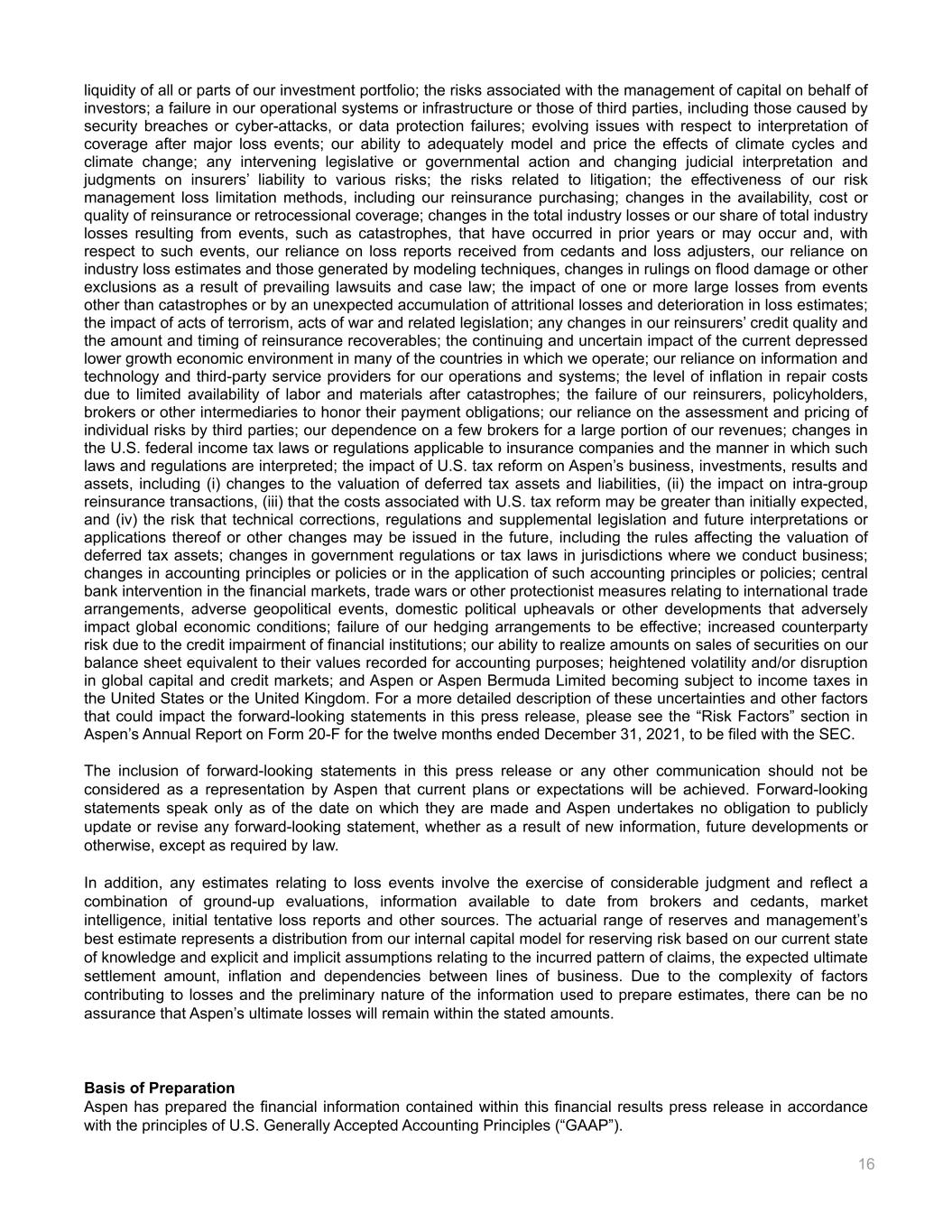
liquidity of all or parts of our investment portfolio; the risks associated with the management of capital on behalf of investors; a failure in our operational systems or infrastructure or those of third parties, including those caused by security breaches or cyber-attacks, or data protection failures; evolving issues with respect to interpretation of coverage after major loss events; our ability to adequately model and price the effects of climate cycles and climate change; any intervening legislative or governmental action and changing judicial interpretation and judgments on insurers’ liability to various risks; the risks related to litigation; the effectiveness of our risk management loss limitation methods, including our reinsurance purchasing; changes in the availability, cost or quality of reinsurance or retrocessional coverage; changes in the total industry losses or our share of total industry losses resulting from events, such as catastrophes, that have occurred in prior years or may occur and, with respect to such events, our reliance on loss reports received from cedants and loss adjusters, our reliance on industry loss estimates and those generated by modeling techniques, changes in rulings on flood damage or other exclusions as a result of prevailing lawsuits and case law; the impact of one or more large losses from events other than catastrophes or by an unexpected accumulation of attritional losses and deterioration in loss estimates; the impact of acts of terrorism, acts of war and related legislation; any changes in our reinsurers’ credit quality and the amount and timing of reinsurance recoverables; the continuing and uncertain impact of the current depressed lower growth economic environment in many of the countries in which we operate; our reliance on information and technology and third-party service providers for our operations and systems; the level of inflation in repair costs due to limited availability of labor and materials after catastrophes; the failure of our reinsurers, policyholders, brokers or other intermediaries to honor their payment obligations; our reliance on the assessment and pricing of individual risks by third parties; our dependence on a few brokers for a large portion of our revenues; changes in the U.S. federal income tax laws or regulations applicable to insurance companies and the manner in which such laws and regulations are interpreted; the impact of U.S. tax reform on Aspen’s business, investments, results and assets, including (i) changes to the valuation of deferred tax assets and liabilities, (ii) the impact on intra-group reinsurance transactions, (iii) that the costs associated with U.S. tax reform may be greater than initially expected, and (iv) the risk that technical corrections, regulations and supplemental legislation and future interpretations or applications thereof or other changes may be issued in the future, including the rules affecting the valuation of deferred tax assets; changes in government regulations or tax laws in jurisdictions where we conduct business; changes in accounting principles or policies or in the application of such accounting principles or policies; central bank intervention in the financial markets, trade wars or other protectionist measures relating to international trade arrangements, adverse geopolitical events, domestic political upheavals or other developments that adversely impact global economic conditions; failure of our hedging arrangements to be effective; increased counterparty risk due to the credit impairment of financial institutions; our ability to realize amounts on sales of securities on our balance sheet equivalent to their values recorded for accounting purposes; heightened volatility and/or disruption in global capital and credit markets; and Aspen or Aspen Bermuda Limited becoming subject to income taxes in the United States or the United Kingdom. For a more detailed description of these uncertainties and other factors that could impact the forward-looking statements in this press release, please see the “Risk Factors” section in Aspen’s Annual Report on Form 20-F for the twelve months ended December 31, 2021, to be filed with the SEC. The inclusion of forward-looking statements in this press release or any other communication should not be considered as a representation by Aspen that current plans or expectations will be achieved. Forward-looking statements speak only as of the date on which they are made and Aspen undertakes no obligation to publicly update or revise any forward-looking statement, whether as a result of new information, future developments or otherwise, except as required by law. In addition, any estimates relating to loss events involve the exercise of considerable judgment and reflect a combination of ground-up evaluations, information available to date from brokers and cedants, market intelligence, initial tentative loss reports and other sources. The actuarial range of reserves and management’s best estimate represents a distribution from our internal capital model for reserving risk based on our current state of knowledge and explicit and implicit assumptions relating to the incurred pattern of claims, the expected ultimate settlement amount, inflation and dependencies between lines of business. Due to the complexity of factors contributing to losses and the preliminary nature of the information used to prepare estimates, there can be no assurance that Aspen’s ultimate losses will remain within the stated amounts. Basis of Preparation Aspen has prepared the financial information contained within this financial results press release in accordance with the principles of U.S. Generally Accepted Accounting Principles (“GAAP”). 16
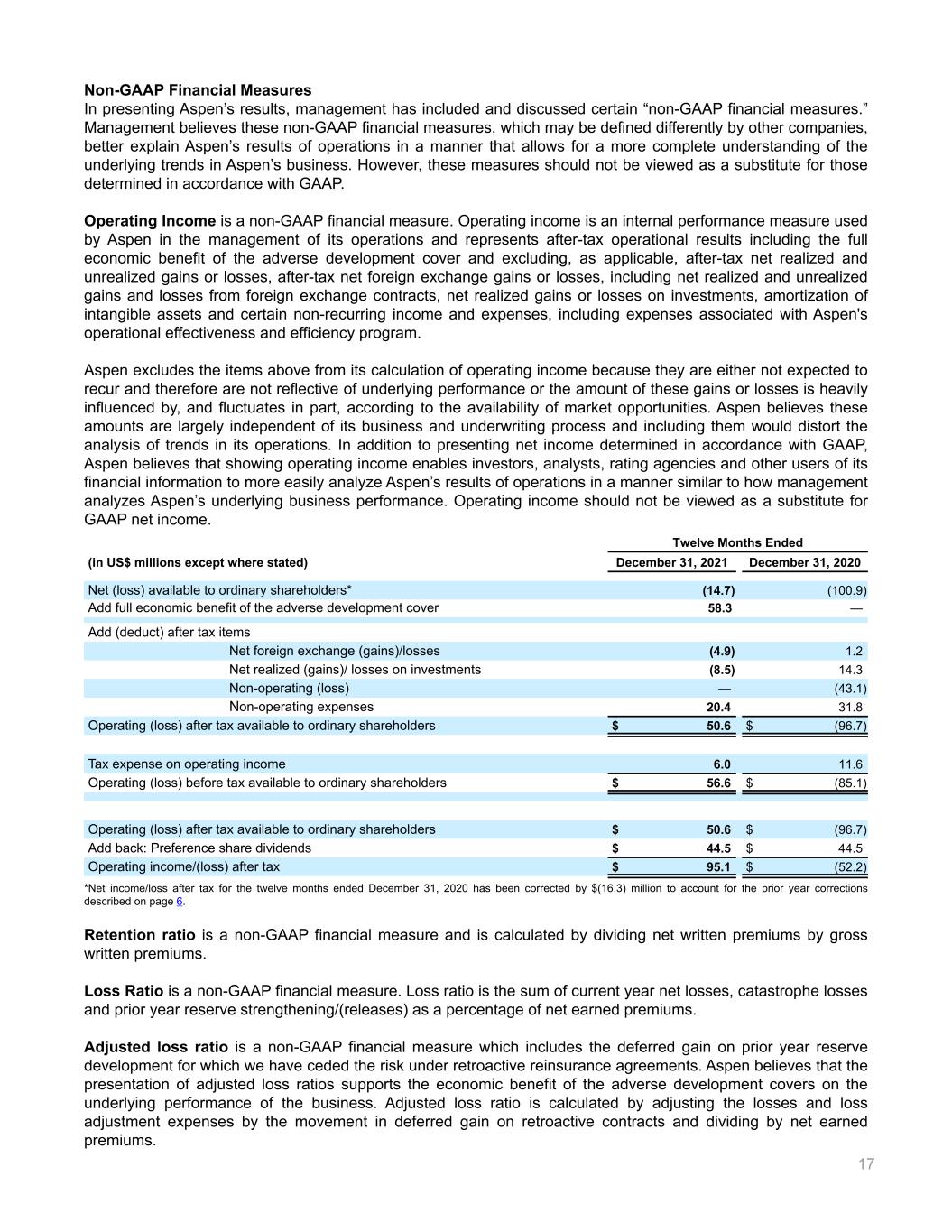
Non-GAAP Financial Measures In presenting Aspen’s results, management has included and discussed certain “non-GAAP financial measures.” Management believes these non-GAAP financial measures, which may be defined differently by other companies, better explain Aspen’s results of operations in a manner that allows for a more complete understanding of the underlying trends in Aspen’s business. However, these measures should not be viewed as a substitute for those determined in accordance with GAAP. Operating Income is a non-GAAP financial measure. Operating income is an internal performance measure used by Aspen in the management of its operations and represents after-tax operational results including the full economic benefit of the adverse development cover and excluding, as applicable, after-tax net realized and unrealized gains or losses, after-tax net foreign exchange gains or losses, including net realized and unrealized gains and losses from foreign exchange contracts, net realized gains or losses on investments, amortization of intangible assets and certain non-recurring income and expenses, including expenses associated with Aspen's operational effectiveness and efficiency program. Aspen excludes the items above from its calculation of operating income because they are either not expected to recur and therefore are not reflective of underlying performance or the amount of these gains or losses is heavily influenced by, and fluctuates in part, according to the availability of market opportunities. Aspen believes these amounts are largely independent of its business and underwriting process and including them would distort the analysis of trends in its operations. In addition to presenting net income determined in accordance with GAAP, Aspen believes that showing operating income enables investors, analysts, rating agencies and other users of its financial information to more easily analyze Aspen’s results of operations in a manner similar to how management analyzes Aspen’s underlying business performance. Operating income should not be viewed as a substitute for GAAP net income. Twelve Months Ended (in US$ millions except where stated) December 31, 2021 December 31, 2020 Net (loss) available to ordinary shareholders* (14.7) (100.9) Add full economic benefit of the adverse development cover 58.3 — Add (deduct) after tax items Net foreign exchange (gains)/losses (4.9) 1.2 Net realized (gains)/ losses on investments (8.5) 14.3 Non-operating (loss) — (43.1) Non-operating expenses 20.4 31.8 Operating (loss) after tax available to ordinary shareholders $ 50.6 $ (96.7) Tax expense on operating income 6.0 11.6 Operating (loss) before tax available to ordinary shareholders $ 56.6 $ (85.1) Operating (loss) after tax available to ordinary shareholders $ 50.6 $ (96.7) Add back: Preference share dividends $ 44.5 $ 44.5 Operating income/(loss) after tax $ 95.1 $ (52.2) *Net income/loss after tax for the twelve months ended December 31, 2020 has been corrected by $(16.3) million to account for the prior year corrections described on page 6. Retention ratio is a non-GAAP financial measure and is calculated by dividing net written premiums by gross written premiums. Loss Ratio is a non-GAAP financial measure. Loss ratio is the sum of current year net losses, catastrophe losses and prior year reserve strengthening/(releases) as a percentage of net earned premiums. Adjusted loss ratio is a non-GAAP financial measure which includes the deferred gain on prior year reserve development for which we have ceded the risk under retroactive reinsurance agreements. Aspen believes that the presentation of adjusted loss ratios supports the economic benefit of the adverse development covers on the underlying performance of the business. Adjusted loss ratio is calculated by adjusting the losses and loss adjustment expenses by the movement in deferred gain on retroactive contracts and dividing by net earned premiums. 17

Aspen has defined catastrophe losses in the twelve months ended December 31, 2021 as losses associated with Texas winter storms, Hurricane Ida, European floods and other weather-related events. Catastrophe losses in the twelve months ended December 31, 2020 were defined as losses associated with COVID-19, Hurricanes Isaias and Laura, wildfires in California and other weather-related events. Twelve Months Ended December 31, 2021 Adjusted Loss ratio Reinsurance Insurance Total ($ in millions) % ($ in millions) % ($ in millions) % Net earned premium . . . . . . . . . . . . . . . . . . . . . . $ 1,118.8 $ 1,291.7 $ 2,410.5 Losses excluding catastrophes and prior year reserve movements . . . . . . . . . . . . . . . . . . . . . . . 584.6 52.3 % 736.9 57.0 1,321.5 54.7 % Catastrophe losses . . . . . . . . . . . . . . . . . . . . . . . 255.0 22.8 71.7 5.6 326.7 13.6 Prior year reserve movements . . . . . . . . . . . . . . (134.4) (12.0) 179.5 13.9 45.1 1.9 Losses and loss adjustment expenses/ Loss ratio (%) . . . . . . . . . . . . . . . . . . . . . . . . . . . . $ 705.2 63.0 % $ 988.1 76.5 % $ 1,693.3 70.2 % Add: Movement in deferred gain on retroactive contracts . . . . . . . . . . . . . . . . . . . . . . (41.4) (3.7) % (16.9) (1.3) % (58.3) (2.4) % Adjusted losses and loss adjustment expenses/ Adjusted loss ratio (%) . . . . . . . . . . . $ 663.8 59.3 % $ 971.2 75.2 % $ 1,635.0 67.8 % As at December 31, 2020 Adjusted Loss ratio Reinsurance Insurance Total ($ in millions) % ($ in millions) % ($ in millions) % Net earned premium . . . . . . . . . . . . . . . . . . . . . . $ 1,287.7 $ 1,239.8 $ 2,527.5 Losses excluding catastrophes and prior year reserve movements . . . . . . . . . . . . . . . . . . . . . . . 750.7 58.3 % 730.2 58.9 % 1,480.9 58.6 % Catastrophe losses (including COVID) . . . . . . 244.0 18.9 116.8 9.4 360.8 14.3 Prior year reserve movements . . . . . . . . . . . . . (36.1) (2.8) 35.2 2.8 % $ (0.9) — Losses and loss adjustment expenses Loss ratio (%) . . . . . . . . . . . . . . . . . . . . . . . . . . . . $ 958.6 74.4 % $ 882.2 71.1 % $ 1,840.8 72.8 % Add: Movement in deferred gain on retroactive contracts . . . . . . . . . . . . . . . . . . . . . . — % — % — % — % — % — % Adjusted losses and loss adjustment expenses Adjusted loss ratio (%) . . . . . . . . . . . $ 958.6 74.4 % $ 882.2 71.1 % $ 1,840.8 72.8 % Combined ratio is the sum of the loss ratio and general and administrative expense ratio. The loss ratio is calculated by dividing losses and loss adjustment expenses by net earned premiums. The expense ratio is calculated by dividing the sum of amortization and deferred policy acquisition costs and general and administrative expenses, by net earned premiums. Accident Year Combined Ratio is a non-GAAP financial measure and is the sum of the adjusted losses and loss adjustment expenses, excluding prior year reserve movements, and the sum of amortization and deferred policy acquisition costs and general and administrative expenses, divided by net earned premiums. 18
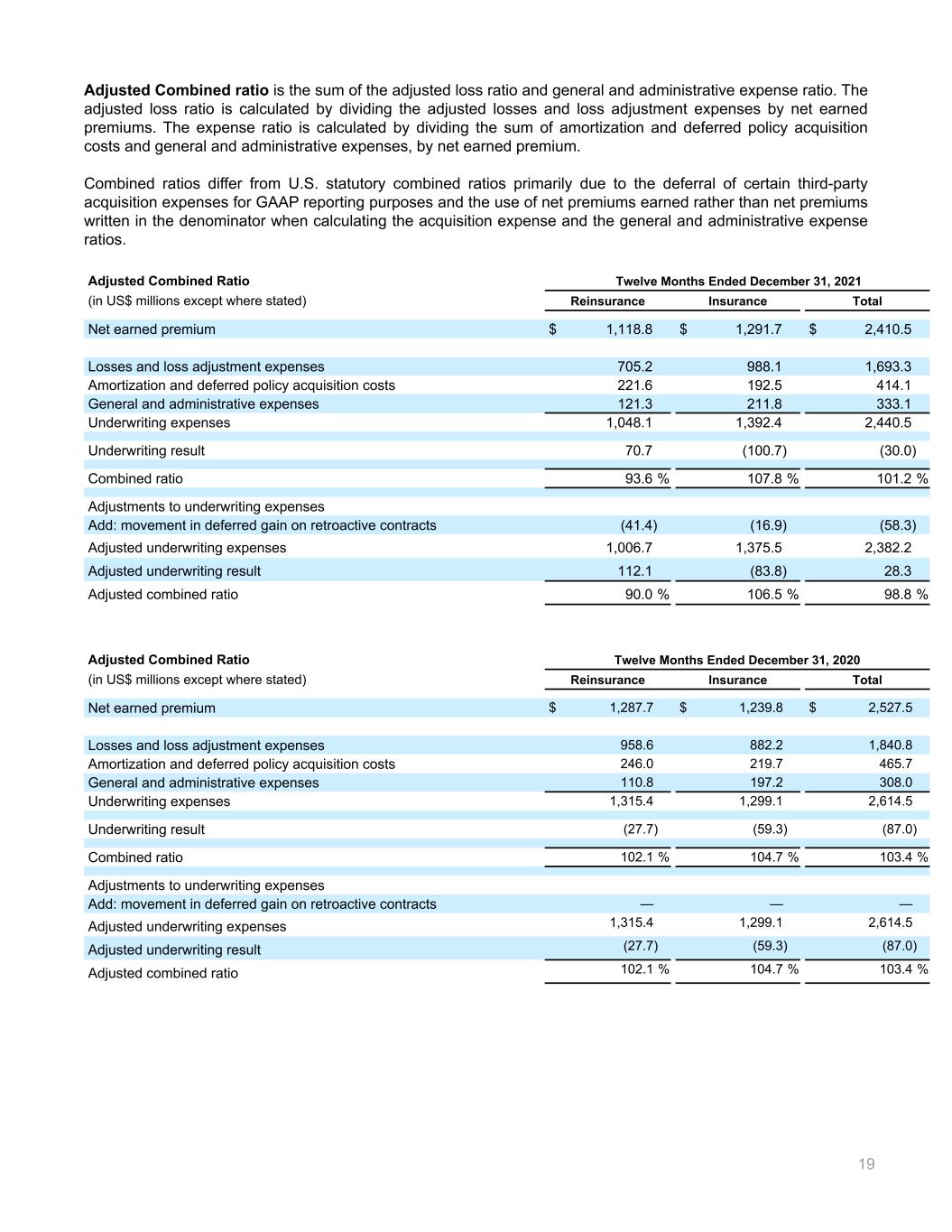
Adjusted Combined ratio is the sum of the adjusted loss ratio and general and administrative expense ratio. The adjusted loss ratio is calculated by dividing the adjusted losses and loss adjustment expenses by net earned premiums. The expense ratio is calculated by dividing the sum of amortization and deferred policy acquisition costs and general and administrative expenses, by net earned premium. Combined ratios differ from U.S. statutory combined ratios primarily due to the deferral of certain third-party acquisition expenses for GAAP reporting purposes and the use of net premiums earned rather than net premiums written in the denominator when calculating the acquisition expense and the general and administrative expense ratios. Adjusted Combined Ratio Twelve Months Ended December 31, 2021 (in US$ millions except where stated) Reinsurance Insurance Total Net earned premium $ 1,118.8 $ 1,291.7 $ 2,410.5 Losses and loss adjustment expenses 705.2 988.1 1,693.3 Amortization and deferred policy acquisition costs 221.6 192.5 414.1 General and administrative expenses 121.3 211.8 333.1 Underwriting expenses 1,048.1 1,392.4 2,440.5 Underwriting result 70.7 (100.7) (30.0) Combined ratio 93.6 % 107.8 % 101.2 % Adjustments to underwriting expenses Add: movement in deferred gain on retroactive contracts (41.4) (16.9) (58.3) Adjusted underwriting expenses 1,006.7 1,375.5 2,382.2 Adjusted underwriting result 112.1 (83.8) 28.3 Adjusted combined ratio 90.0 % 106.5 % 98.8 % Adjusted Combined Ratio Twelve Months Ended December 31, 2020 (in US$ millions except where stated) Reinsurance Insurance Total Net earned premium $ 1,287.7 $ 1,239.8 $ 2,527.5 Losses and loss adjustment expenses 958.6 882.2 1,840.8 Amortization and deferred policy acquisition costs 246.0 219.7 465.7 General and administrative expenses 110.8 197.2 308.0 Underwriting expenses 1,315.4 1,299.1 2,614.5 Underwriting result (27.7) (59.3) (87.0) Combined ratio 102.1 % 104.7 % 103.4 % Adjustments to underwriting expenses Add: movement in deferred gain on retroactive contracts — — — Adjusted underwriting expenses 1,315.4 1,299.1 2,614.5 Adjusted underwriting result (27.7) (59.3) (87.0) Adjusted combined ratio 102.1 % 104.7 % 103.4 % 19


















